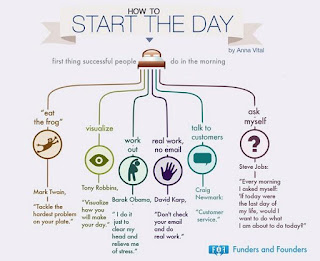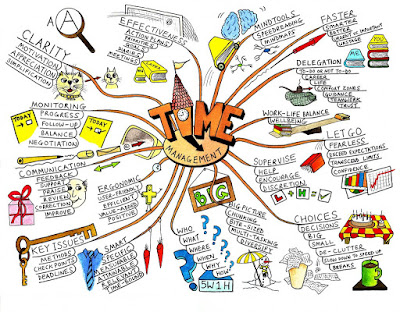
What you do today decide your future, therefore present is your future, do what is expected to do and go to extra mile.
Your ‘frog’ is your biggest, most important task here,
1. If you have two frogs, eat the ‘ugliest’ one first.
2. If you have to eat a frog, don’t procrastinate (delay) on it.
The Five Big Ideas
1. “The key to reaching high levels of performance and productivity is to develop the lifelong habit of tackling your major task first thing each morning.”
2. “Think about your goals and review them daily. Every morning when you begin, take action on the most important task you can accomplish to achieve your most important goal at the moment.”
3. “Think on paper.” Kinesthetic person does like this usually.
4. “Always work from a list.”
5. “Your ability to choose between the important and the unimportant is the key determinant of your success in life and work.”

The Eisenhower Decision Matrix: Important vs. Urgent

Eat That Frog Summary·
“Your ‘frog’ is your biggest, most important task, the one you are most likely to procrastinate on if you don’t do something about it.”·
“The first rule of frog eating is this: If you have to eat two frogs, eat the ugliest one first.”·
“Continually remind yourself that one of the most important decisions you make each day is what you will do immediately and what you will do later if you do it at all.”·
“The second rule of frog eating is this: If you have to eat a live frog at all, it doesn’t pay to sit and look at it for very long.”·
“The key to reaching high levels of performance and productivity is to develop the lifelong habit of tackling your major task first thing each morning.”
Steps to achieve it:
1. Set the Table·
“Think on paper.”·
“One of the very worst uses of time is to do something very well that need not be done at all.”·
“Think about your goals and review them daily. Every morning when you begin, take action on the most important task you can accomplish to achieve your most important goal at the moment.”
2. Plan Every Day in Advance·
“Always work from a list.”·
“Make your list the night before for the workday ahead.”·
“You need different lists for different purposes.”·
“First, you should create a master list on which you write down everything you can think of that you want to do sometime in the future.”·
“Second, you should have a monthly list that you make at the end of the month for the month ahead.”·
“Third, you should have a weekly list where you plan your entire week in advance.”·
“Finally, you should transfer items from your monthly and weekly lists onto your daily list.”
3. Apply the 80/20 Rule to Everything·
“Before you begin work, always ask yourself, ‘Is this task in the top 20 percent of my activities or in the bottom 80 percent?’”·
“Resist the temptation to clear up small things first.”·
“Your ability to choose between the important and the unimportant is the key determinant of your success in life and work.”
4. Consider the Consequences (pros and cons)·
“Long-term thinking improves short-term decision making.”·
“In your work, having a clear and exact idea of what is really important to you in the long term makes it much easier for you to make better decisions about your priorities in the short term.”·
“Before starting on anything, you should always ask yourself, ‘What are the potential consequences of doing or not doing this task?’”·
“Future intent influences and often determines present actions.”·
“Successful people are those who are willing to delay gratification and make sacrifices in the short term so that they can enjoy far greater rewards in the long term.”·
“Motivation requires motive.”·
“Thinking continually about the potential consequences of your choices, decisions, and behaviors is one of the very best ways to determine your true priorities in your work and personal life.”·
The Law of Forced Efficiency: “There is never enough time to do everything, but there is always enough time to do the most important thing.”·
“There will never be enough time to do everything you have to do.”
Ask yourself:
1. “What are my highest value activities?”
2. “What can I and only I do that if done well will make a real difference?”
3. “What is the most valuable use of my time right now?”
4. “What is my biggest frog of all at this moment?”
“Do first things first and second things not at all.”
5. Practice Creative Procrastination·
“The difference between high performers and low performers is largely determined by what they choose to procrastinate on.”·
“To set proper priority, you must set posteriority as well.”·
“A priority is something that you do more of and sooner, while a posteriority is something that you do less of and later, if at all.”·
“You can get your time and your life under control only to the degree to which you discontinue lower-value activities.”·
“Say no to anything that is not a high-value use of your time and your life.” ·
“Continually review your life and work to find time-consuming tasks and activities that you can abandon. Cut down on television watching and instead spend the time with your family, read, exercise, or do something else that enhances the quality of your life.”·
“Ask yourself continually, ‘If I were not doing this already, knowing what I now know, would I start doing it again today?’”

6. Use the ABCDE Method Continually·
“You start with a list of everything you have to do for the coming day. Think on paper. You then place an A, B, C, D, or E next to each item on your list before you begin the first task.”·
“An ‘A’ item is defined as something that is very important, something that you must do. This is a task that will have serious positive or negative consequences if you do it or fail to do it, like visiting a key customer or finishing a report that your boss needs for an upcoming board meeting.”·
“A ‘B’ item is defined as a task that you should do.”·
“The rule is that you should never do a B task when an A task is left undone.”·
“A ‘C’ task is defined as something that would be nice to do but for which there are no consequences at all, whether you do it or not.”·
“A ‘D’ task is defined as something you can delegate to someone else.”·
“An ‘E’ task is defined as something that you can eliminate altogether, and it won’t make any real difference.”
7. Focus on Key Result Areas·
One of the greatest questions you will ever ask yourself: “What one skill, if I developed and did it in an excellent fashion, would have the greatest positive impact on my career?”
8. Apply the Law of Three·
“Identify your three most important goals in each area of your life. Organize them by priority.
9. Prepare Thoroughly Before You Begin·
“Take a good look at your desk or office, both at home and at work.” The cleaner and neater your work environment, the more positive, productive, and confident, you will feel.
10. Take It One Oil Barrel at a Time·
Get your mind off the huge task in front of you and focus on a single action that you can take.
11. Upgrade Your Key Skills·
“Continuous learning is the minimum requirement for success in any field.”
12. Identify Your Key Constraints·
Successful people always begin the analysis of constraints by asking the question, “What is it in me that is holding me back?”·
Keep asking, “What sets the speed at which I get the results I want?”
13. Put the Pressure on Yourself·
“To reach your full potential, you must form the habit of putting the pressure on yourself and not waiting for someone else to come along and do it for you.”·
Work as though you have only one day to get your most important jobs done.
14. Maximize Your Personal Powers·
“Whenever you feel overtired and overwhelmed with too much to do and too little time, stop yourself and just say, ‘All I can do is all I can do.’”·
“Take one full day off every week. During this day, either Saturday or Sunday, absolutely refuse to read, clear correspondence, catch up on things from the office, or do anything else that taxes your brain.
”Resolve today to improve your levels of health and energy by asking the following questions:
1. “What am I doing physically that I should do more of? What am I doing that I should do less of?”
2. “What am I not doing that I should start doing if I want to perform at my best?”
3. “What am I doing today that affects my health that I should stop doing altogether?”
15. Motivate Yourself into Action·
Optimism is the most important quality you can develop for personal and professional success and happiness. Optimists have four special behaviors, all learned through practice and repetition:
1. They look for the good in every situation
2. They always seek the valuable lesson in every setback or difficulty
3. They always look for the solution to every problem
4. They think and talk continually about their goals
16. Get Out of the Technological Time Sinks·
“For you to be able to concentrate on those few things that make the most difference in your business or personal life, you must discipline yourself to treat technology as a servant, not as a master.”·
“Very few things are so important that they cannot wait.”
17. Create Large Chunks of Time·
Schedule blocks of time-Make work appointments with yourself·
Use a planner-eliminate all distraction during work.·
Make every minute count-use your travel and transition times.
18. Develop a Sense of Urgency·
Highly-effective people launch quickly and strongly toward their goals and objectives.·
“With this ingrained sense of urgency, you develop a ‘bias for action.’”·
“One of the simplest and yet most powerful ways to get yourself started is to repeat the words ‘Do it now! Do it now! Do it now!’ over and over to yourself.”
19. Single Handle Every Task·
“Single handling requires that once you begin, you keep working at the task without diversion or distraction until the job is 100 percent complete.”
